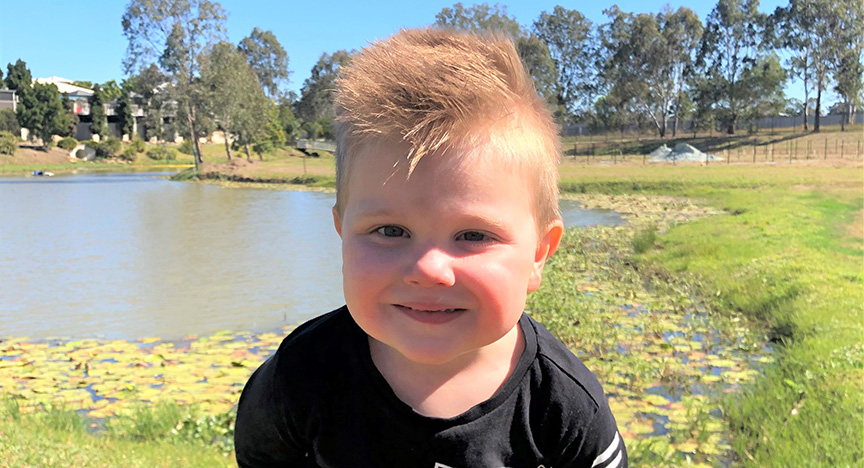
Spencer was playing happily with his truck at his Brisbane home one day when he tried and failed to stand up.
Earlier that day in 2019 Spencer, who was three days away from his second birthday, had fallen over suddenly. So, when he couldn’t stand up his parents Deb and Hayley assumed it was because of the fall. But this time it was different.
“His legs wouldn’t work,” his mum Deb says. “We were still thinking he had hurt his leg, [so we] felt his leg to see if he reacted to pain. He didn’t.”
Then they noticed his whole body was leaning to one side.
After a quick visit to the family GP, Deb and Hayley took Spencer to the Queensland Children’s Hospital.
Emergency room doctors and nurses suspected the toddler had had a stroke.
Subsequent tests confirmed Spencer had developed a blood clot in his brain, which had blocked a brain blood vessel, causing the stroke.
Spencer became one of the youngest children in Australia to be treated under the Queensland Children’s Hospital’s newly implemented Code Stroke protocol.
Clinicians acted quickly, giving Spencer a drip for fluids and medication. He was put under a general anaesthetic. This way he could have the MRI scan to check for a clot that would require urgent treatment and his brain function for any potential damage from the suspected stroke.
When the clot causing the stroke was confirmed, doctors gave Spencer a drug that breaks up blood clots, alteplase, making him one of just a handful of children in Australia who have had this clot-busting medication.
Those quick actions helped reduce the size of the stroke. Time is critical to reducing stroke impacts.
Spencer spent four nights in the hospital’s intensive care unit, followed by another eight nights on the ward while he recovered.
Now, almost a year on, Deb recalls the fear of the stroke experience and the uncertainty it brought to their family.
“It was the most terrifying frightening night of our life,” she says. “You never want to hear that your child is sick, but to hear the word ‘stroke’ with regards to your two-year-old baby boy is terrifying.”
Spencer continues to feel ongoing effects of the stroke. He gets fatigued easily and has weakness on one side of his body.
His family and his carers at childcare remain vigilant for any signs, given repeat strokes can happen.
Three-monthly visits to the Queensland Children’s Hospital for rehabilitation and neurology services have become a regular feature of their family life.
But overall, Spencer’s recovery is progressing well and he’s back where he began, playing happily with his trucks.